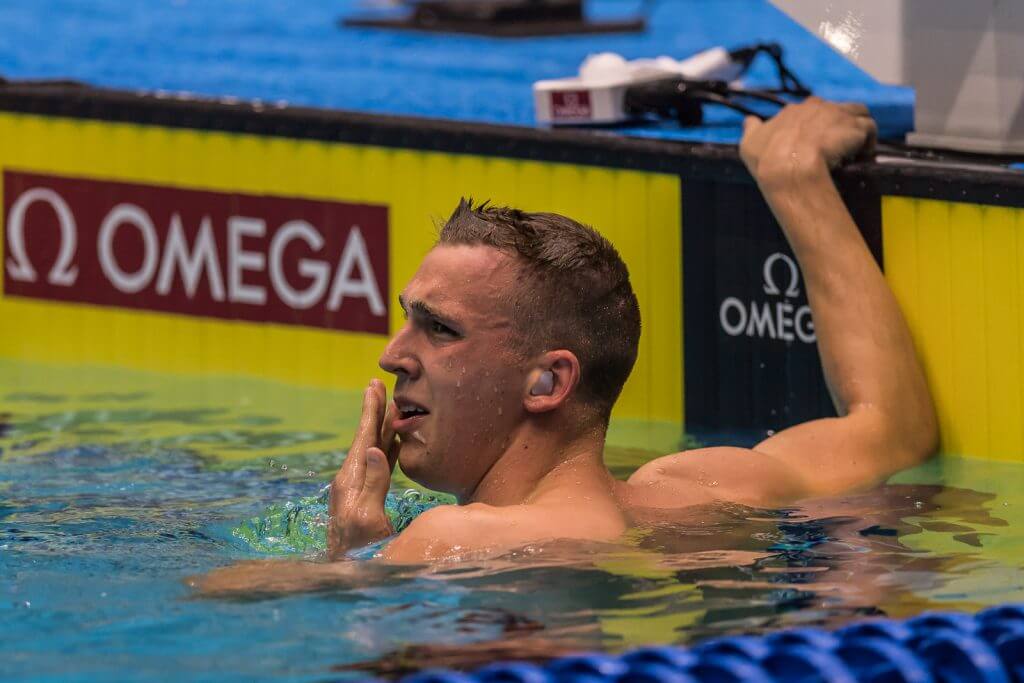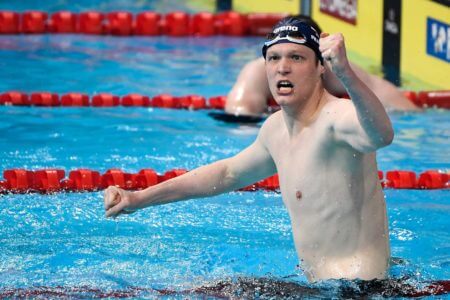NCAA Swimming Flashback: The Greatest College Distance Race Ever

Editorial content for the 2022 NCAA DI Men's Swimming & Diving Championships coverage is sponsored by Swiss Timing.
See full event coverage.
Follow Swiss Timing on Instagram at @omega #OMEGAOfficialTimekeeper

NCAA Swimming Flashback: The Greatest College Distance Race Ever
Most non-hardcore swimming fans find watching a mile-long race boring. TV broadcasts like to take commercial breaks during the 1500-meter or 1650-yard freestyle, and excitement around the race is toned down compared to upcoming relay showdowns or anticipated record-chasing swims in shorter individual events.
However, college swimming has produced some incredible 1650 races over the years, and any fan who turned away during these swims was really missing out. For instance, it’s impossible to forget the fastest heat of the 1650 free at the 2016 Men’s NCAA Championships in Atlanta. Three different swimmers held significant leads over the field at separate points in the race — and none of them won the title.
Texas junior Clark Smith held the early advantage. He had been the pre-race favorite, but Smith had not raced since finishing a shocking 21st two days earlier in the 500 free, an event he entered as the defending national champion. Then, Michigan’s PJ Ransford turned on the gas on the second 500 yards to take command, but he fell apart after the 1000-yard mark, his 50-yard splits increasing by almost three seconds.
After that, South Carolina’s Akram Mahmoud pulled out to a four-second lead with 150 yards to go, and even with just a 50 left, Mahmoud led by a whopping 2.67 seconds. But Mahmoud could not change gears on the last 50, and Penn’s Chris Swanson did. Out of nowhere, Swanson split 24.38 coming home to run down and pass Mahmoud. Swanson touched in 14:31.54, 0.12 ahead of Mahmoud. Smith ended up 12th, while Ransford was 13th.
Sounds incredible, right? It was, but somehow, the showdown one year later proved even better.

Years before he was a world champion, Felix Aubock finished second in the epic 1650 free at the 2017 NCAA Championships — Photo Courtesy: Andrea Staccioli / Deepbluemedia / Insidefoto
In 2017, Smith had returned to top form, and he had swum the fastest time ever in the 500 free two days earlier. Northwestern’s Jordan Wilimovsky had returned to college swimming following an Olympics where he finished fourth in the 1500-meter free and fifth in the open water 10K race. Mahmoud was also back after his heart-breaking finish the year before, while the top seed in the event was Felix Aubock, a Michigan freshman and native of Austria who was the only man in the nation to break 14:30 going into the meet.
In the quickest heat of the event, Aubock was in lane four, Smith in five, Wilimovsky in six and Mahmoud in eight. Ransford was also in the heat, swimming in lane one, and he kept it interesting through 1000 yards, but then the other four competitors took off. Unlike the corresponding NCAA race in 2016, no one jumped out to a significant lead or took command of the race. The four men went back-and-forth, and none could separate from the pack.
With 50 meters to go, Smith turned just four hundredths ahead of Mahmoud, but Aubock and Wilimovsky were still within striking distance. Aubock turned on the jets, but he could not catch Smith. Smith won in 14:22.41, with Aubock (14:22.88), Mahmoud (14:22.99) and Wilimovsky (14:23.45).
All four swimmers broke the all-time record in the event, a mark previously held by Connor Jaeger at 14:23.52. Jaeger, who had retired from swimming months earlier after winning silver in the 1500-meter free at the Rio Olympics, fell from first to fifth all-time in just one intense final. Jaeger added that the race was “a great representation of distance racing in general.”
After capturing the title, Smith had to be helped off the pool deck, and he was unable to accept his award in-person. Smith later revealed that he had pulled his groin while pushing off the wall during the 500 free final, and he had scratched the 200 free on the middle day of the meet because the pain was bothering him so much. It still hurt when the 1650 came around, but Smith decided to go for it anyway.
“I didn’t want to make any premeditated excuses. I just decided to suck it up and race,” Smith said. “Around the 1200, it got really bad, and my ego kind of finished the race for me. The last 10 lengths, I kind of just sucked it up because I knew that no one would feel bad for me, so I just had to put it together on my own.”
Smith added that he didn’t care about his splits and never planned to look at them, but despite his intense pain, he delivered a record-breaking performance against the fiercest of competition.
A few days later, longtime NCAA Championships announcer Sam Kendricks called this 1650 freestyle “the greatest race I’ve ever seen in person,” and few inside the Indiana University Natatorium that evening would have disagreed.




.png)